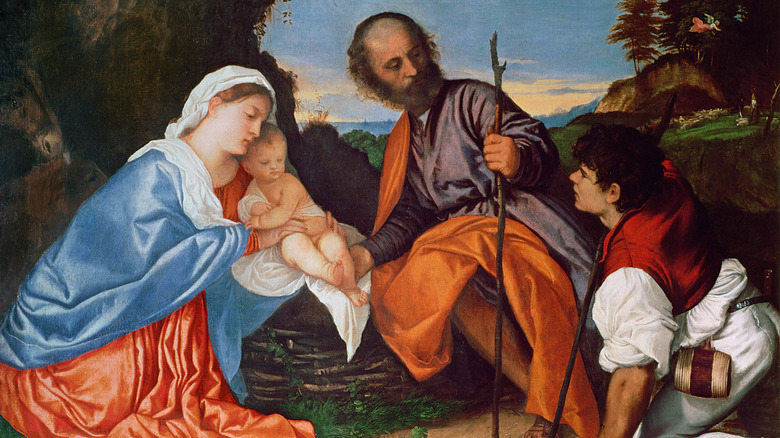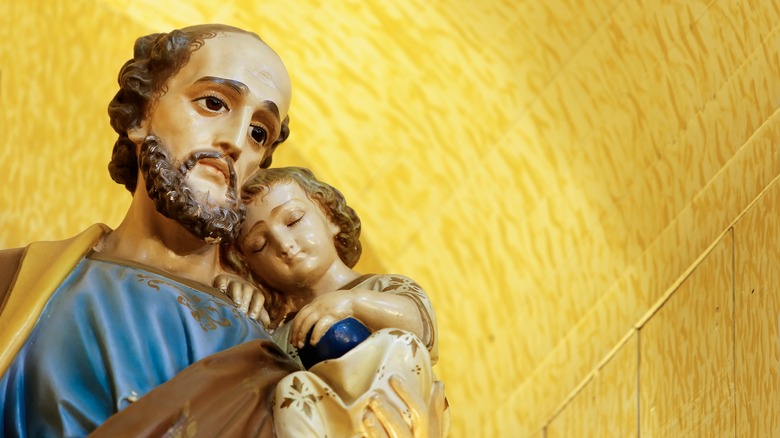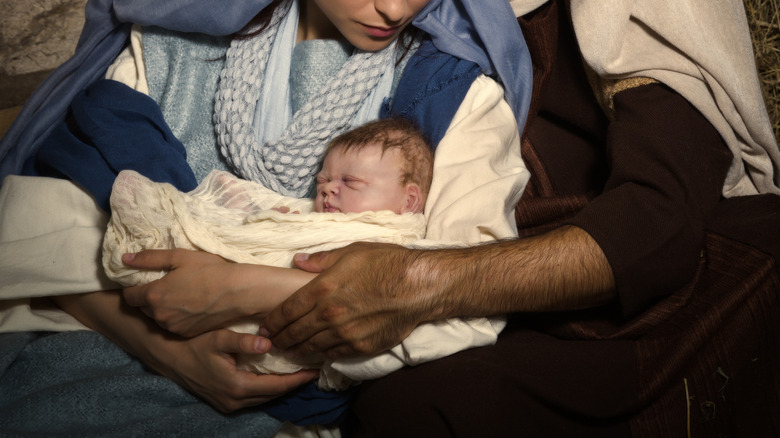How Did Mary's Husband Joseph React When She Was Pregnant With Jesus?
The story is extremely familiar to Christians of all stripes: Mary, the Mother of Jesus, gets a visit from an angel telling her that she's going to miraculously bear the Messiah, something-something Caesar and a census, a trip to Bethlehem, a manger, some wise men bearing gifts, and boom: it's savior time. Also, Joseph was there. And if that sounds glib, well, the Bible really doesn't tell us much about Joseph, who along with Mary raised Jesus. Some assume this is because Joseph wasn't that important to the story, but there's no way to say for sure.
The Bible also doesn't tell us precisely how Joseph reacted to news that his betrothed was pregnant, although it's implied that his initial response — like any husband-to-be — was not too fantastically happy. This is why Matthew 1:19 describes how Joseph "had in mind to divorce her [Mary] quietly." We can assume that Joseph was a skeptic of his son's divine status at that point because he required some convincing via his own angelic visit.
Besides this information, we've got a couple of methods to clarify how Joseph likely reacted to the news of Mary's pregnancy: 1) general inferences and assumptions based on the very, very conservative Jewish culture of the time, and 2) descriptions of what Joseph did. The latter is more valuable to us than Joseph's reaction, anyway, because actions are the true test of character, not thoughts, opinions, or feelings. Anything else is speculation and doesn't fit the scope of this article.
Joseph kept quiet about Mary's pregnancy
By the time year 0 rolled around, the Jewish state of Judea had been under the control of the Roman empire for about 63 years and would stay that way until 313 C.E. Jews of the time were not necessarily happy with this arrangement, and wound up revolting again and again. As a smaller culture within a greater empire, they clung to traditional beliefs, meaning they followed whatever was written in the Pentateuch, the first five books of the Bible. Such laws included stoning to death "promiscuous" women, women who were raped, and so forth. All Joseph had to do was speak up about his pregnant wife-to-be, Mary, and she would have been stoned to death by the local community.
Joseph, however, kept silent. He didn't want to "expose her [Mary] to public shame. In this way, no matter how Joseph personally felt about the news of Mary's pregnancy, he went against the current of the day by not drawing attention to her. This was Joseph's fundamental reaction. Maybe he was incredulous, maybe he was hurt, maybe he believed that Mary had had a premarital liaison — we don't know and the Bible doesn't mention it. But, he definitely wasn't concerned with prophecy stuff, Messiah stuff, or the forthcoming origins of a thousands-year-old, major world religion at that point. Joseph was concerned with the norms, rules, and traditions of the time. He was also concerned with not seeing his betrothed — no matter the truth behind her pregnancy — come to death.
Judging Joseph by his actions
We can look to Joseph's actions to further understand his reaction to the news of Mary's pregnancy. Despite not wanting to reveal Mary's pregnancy to the local community, Joseph "had in mind to divorce her [Mary] quietly." While this makes Joseph compassionate it also makes him a realist and traditionalist of sorts.
Shortly thereafter Joseph apparently went home to sleep on the matter, and that's when he had a dream in which he was visited by an angel. The angel confirmed the tale about Mary being pregnant with a holy child that was related to an ancient prophecy, and that's all it took for Joseph to be a believer. The next line in Matthew 1:24 simply says, "When Joseph woke up, he did what the angel of the Lord had commanded him and took Mary home as his wife." And then to drive home the point of Joseph's piety and obedience to God, the next verse says, "But he did not consummate their marriage until she gave birth to a son. And he gave him the name Jesus."
All in all, such verses — when taken in context with the culture of the time — pretty much tell us everything relevant about Joseph's reaction to Mary's pregnancy. He wasn't happy about it at first, wanted to divorce Mary because of the customs of the day (but not in a way that would kill her), but when he got direct news about the Messiah story he instantly fell in line.


